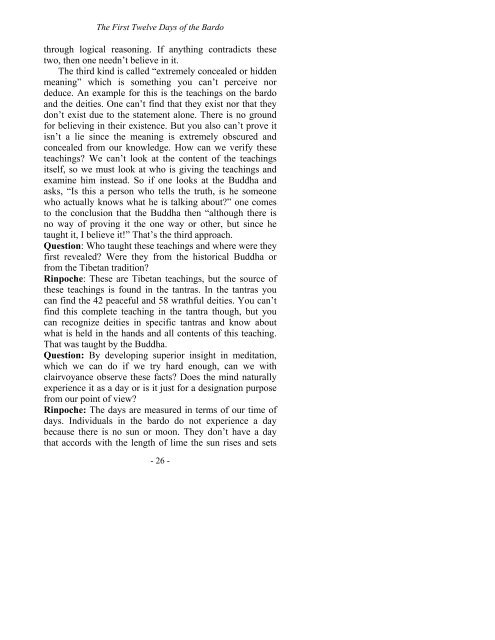bardo
bardo
bardo
You also want an ePaper? Increase the reach of your titles
YUMPU automatically turns print PDFs into web optimized ePapers that Google loves.
The First Twelve Days of the Bardo<br />
through logical reasoning. If anything contradicts these<br />
two, then one needn’t believe in it.<br />
The third kind is called “extremely concealed or hidden<br />
meaning” which is something you can’t perceive nor<br />
deduce. An example for this is the teachings on the <strong>bardo</strong><br />
and the deities. One can’t find that they exist nor that they<br />
don’t exist due to the statement alone. There is no ground<br />
for believing in their existence. But you also can’t prove it<br />
isn’t a lie since the meaning is extremely obscured and<br />
concealed from our knowledge. How can we verify these<br />
teachings? We can’t look at the content of the teachings<br />
itself, so we must look at who is giving the teachings and<br />
examine him instead. So if one looks at the Buddha and<br />
asks, “Is this a person who tells the truth, is he someone<br />
who actually knows what he is talking about?” one comes<br />
to the conclusion that the Buddha then “although there is<br />
no way of proving it the one way or other, but since he<br />
taught it, I believe it!” That’s the third approach.<br />
Question: Who taught these teachings and where were they<br />
first revealed? Were they from the historical Buddha or<br />
from the Tibetan tradition?<br />
Rinpoche: These are Tibetan teachings, but the source of<br />
these teachings is found in the tantras. In the tantras you<br />
can find the 42 peaceful and 58 wrathful deities. You can’t<br />
find this complete teaching in the tantra though, but you<br />
can recognize deities in specific tantras and know about<br />
what is held in the hands and all contents of this teaching.<br />
That was taught by the Buddha.<br />
Question: By developing superior insight in meditation,<br />
which we can do if we try hard enough, can we with<br />
clairvoyance observe these facts? Does the mind naturally<br />
experience it as a day or is it just for a designation purpose<br />
from our point of view?<br />
Rinpoche: The days are measured in terms of our time of<br />
days. Individuals in the <strong>bardo</strong> do not experience a day<br />
because there is no sun or moon. They don’t have a day<br />
that accords with the length of lime the sun rises and sets<br />
- 26 -


